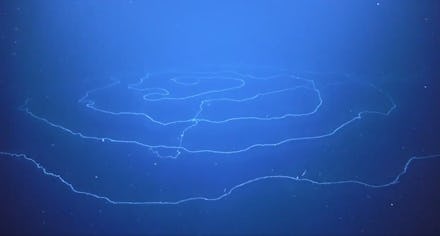Massive "UFO-like" creature could be the longest organism in the ocean

Even normal siphonophores are weird creatures. Ocean organisms that are actually long lines of multiple clones of themselves behaving as a single being, hunting for prey in the deep sea with paralyzing tentacles, it would take one with something really special to shock researchers. But recently, scientists with the Schmidt Ocean Institute found just such a specimen. Clocking in at around 150 feet, or roughly as long as Paris's Arc de Triomphe is high, the team discovered what they believe is the longest organism in the ocean in deep waters near Western Australia.
The gigantic siphonophore, which was coiled into a disk-like shape reminiscent of some sort of space object you'd see in a sci-fi movie, was found during an expedition to an underwater canyon using a remote-controlled deep sea robot. The robot traveled nearly 2,000 feet below the researchers' boat to areas that remained relatively unknown.
"What's fascinating about this particular part of the world is that it has not been explored," Jyotika Virmani, executive director of the Schmidt Ocean Institute, told The New York Times. "Any time people go down into the deep sea, it's so vast and yet so unexplored that it's very easy to make new discoveries and to see something we've never seen before. It is like being on a new planet."
The size of the enormous spiral siphonophore even took the scientists by surprise. "[People] came pouring into the control room to share the excitement," Western Australia Museum’s senior research scientist Nerida Wilson, who led the expedition, told The Guardian. "It was just amazing to see this huge organism spread out like a spiral UFO, hovering in the water column. We couldn't believe what we were seeing."
Though the star of the show was the siphonophore, The New York Times reported that the research team was also able to record up to 30 new species, conduct surveys of the area, and collect DNA samples from the environment.
"While it's a protected area, we actually have no idea what lives there," Wilson told The Guardian. "We really wanted to reveal the incredible biodiversity that is there."
The discoveries from the recent expedition are only the beginning.
"We were definitely looking for and expecting new species," Wilson added. "Those waters were just too unexplored to not yield such treasures."